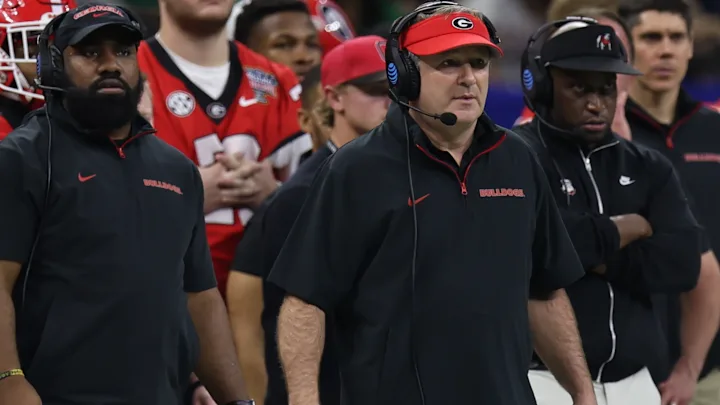Although postponing the Georgia Bulldogs’ spring game would interfere with fan interaction and player development, safety considerations might make it worth it.

The Georgia Bulldogs are one of the most successful programs in college football, consistently competing for championships and producing NFL-caliber talent. One of the key events in the annual college football calendar for any major program is the spring game—an opportunity for the coaching staff to assess talent, for players to showcase their progress, and for fans to interact with their team in a live-game atmosphere.
For the Bulldogs, the spring game is typically a well-attended event, not just by local fans but also by alumni and future recruits. It’s a time to get a glimpse of the upcoming season’s potential, to see how the players who will be central to the next championship run are progressing, and to build excitement around the program.
However, in recent years, spring games have been under scrutiny, especially when concerns about player safety, injuries, and overall player development arise. As college football becomes more physically demanding, the risk of injury during non-competitive spring games has become a point of concern for many coaching staffs. With Georgia being one of the premier programs in the nation, head coach Kirby Smart and his staff have to weigh the importance of spring practices, team development, and fan engagement against the need for player safety and the risk of unnecessary injuries.
Given the evolving landscape of college football, including the rise of NIL (Name, Image, and Likeness), transfer portal, and the increasing demands on players, the question arises: Should the Georgia Bulldogs cancel or postpone their spring game for safety reasons, or does the risk outweigh the reward? This article will explore both sides of the argument.
The Importance of the Spring Game for Player Development
The spring game serves as a unique opportunity for coaching staffs across college football to evaluate their players in a structured, game-like environment. While the spring practices throughout March and April are important for individual skill development, the spring game provides a venue for players to showcase their abilities in a more competitive, albeit controlled, setting.
For Georgia, the spring game offers several benefits that are important for player development:
1. Assessing Depth and Talent
Each year, Georgia’s roster is full of highly ranked recruits who are looking to earn significant playing time. The spring game is often the first time fans and coaches get to see how these players match up against one another in live action. The scrimmage-like nature of the event provides an opportunity for the coaching staff to assess team depth, how newcomers have integrated into the system, and which players are emerging as leaders.
Players who might not be stars during regular season games still have a chance to shine in the spring game, especially if they’ve been working hard in the offseason and during spring practices. It can be particularly valuable for quarterbacks, who may need extra opportunities to demonstrate their ability to lead an offense, and young defensive players, who must prove they can handle the intensity of the SEC.
2. Player Growth and Evaluation in Game Situations
While traditional practices are key to fundamental development, the ability to simulate game-like situations—such as reading defenses, reacting to pressure, and adapting to live competition—is invaluable. The spring game, even if it’s just a mock game scenario, allows the coaches to identify gaps in technique, mental errors, or any need for further development. Players can refine their decision-making skills under pressure, which helps prepare them for the grueling season ahead.
This is especially true for those vying for starting roles or players looking to secure a position on special teams. The pressure of performing in front of a crowd, even if it’s a smaller one compared to the fall, can provide insights into how a player reacts to real-game situations.
3. Building Chemistry and Familiarity
The spring game also allows for the offensive and defensive units to build chemistry in a setting that mirrors a real game. Offensive line combinations, for example, might be adjusted, and the spring game can help the team figure out who works best with who. Running backs, quarterbacks, and receivers can develop more cohesion, while the defensive line, linebackers, and secondary can learn to communicate and respond to different looks.
Chemistry is often the difference between a good team and a great one, and this is precisely the kind of setting where that chemistry can be built, even before the first snap of the regular season.
4. Recruiting and Exposure
The spring game is not just an internal team-building exercise; it also has significant recruiting value. High school recruits, particularly those who are on unofficial visits, get to see Georgia’s program in action and experience the energy surrounding the team. Future players can see how well they fit into the system, interact with coaches, and evaluate the atmosphere.
For Georgia, one of the top programs in the nation, the spring game is a showcase of everything that makes the program elite. The event is often covered by the media, and recruits can see for themselves the level of support, the fan atmosphere, and the elite talent that is nurtured in the program.
The Risks: Player Safety and the Dangers of Spring Games
While the spring game offers many benefits in terms of player development and exposure, there are inherent risks, primarily the potential for injury. The primary concern, as with any football game, is that injuries can happen when players are pushing themselves to perform at a high level. These injuries may be minor sprains or major ligament tears, both of which can significantly affect a player’s future, not only for the upcoming season but for their career.
1. Injuries Are Inevitable
Football is an inherently violent sport, and while the spring game might not carry the same stakes as regular-season games, the risks are still present. Players pushing to earn starting positions or impress coaches may go harder than necessary. The pressure to perform can lead to accidents or unnecessary injuries.
Though coaches often reduce the intensity of the spring game, the very nature of the sport—where players collide at full speed—means injuries are always a concern. Knee injuries, ankle sprains, and muscle strains are common in any football game, even in a less competitive setting.
2. Unnecessary Wear and Tear on Players
Players are already going through months of rigorous training, both physically and mentally, to prepare for the fall season. The physical demands of spring practices can sometimes cause players to overexert themselves, risking injuries. If a player gets hurt during the spring game—an event with no direct bearing on the regular season—it could impact their ability to contribute when the season truly matters.
For the Bulldogs, the risk becomes especially concerning when players like quarterback Carson Beck, wide receiver Ladd McConkey, or defensive lineman Jalen Carter (depending on their status in 2024) are key to the team’s success. A significant injury to any of these players during the spring game could derail Georgia’s momentum going into the fall.
3. Alternative Methods of Evaluation
With advancements in technology and film analysis, coaches can now evaluate player performance without subjecting them to the risks associated with full-contact games. Film breakdowns, scrimmages, and individual drills can be just as effective in assessing talent, especially when coaches can observe how players react to specific situations in a controlled environment.
These tools have made the need for a physical spring game less essential, as evaluations can be done in practice settings where injury risks can be managed more effectively. Virtual simulations and highly specialized drills can replicate competitive scenarios that would otherwise happen in the spring game, reducing the need for full-contact exposure.
Should the Bulldogs Cancel Their Spring Game?
Given the concerns on both sides, the decision to cancel or postpone the spring game hinges on a few key considerations:
- Player Health: If there is a high-risk player, especially a returning starter or key position player, it might make sense for the coaching staff to be extra cautious. Given that injuries in the spring game have no bearing on the season, it might be prudent to cancel or minimize the impact of the game to protect the future of the program.
- Alternative Methods of Development: If Georgia has the infrastructure to evaluate players without a spring game—through controlled scrimmages, one-on-one drills, and film analysis—then the risk-to-reward ratio of the spring game becomes more evident.
- Fan Engagement and Recruiting: The spring game is one of the few times fans can watch the team live before the fall season, and it’s a significant part of Georgia’s fan culture. For recruiting purposes, the spring game is also a valuable tool. Postponing the event might affect engagement, but it’s a small price to pay compared to the potential risk to players.
.









